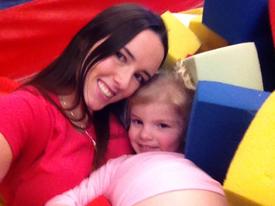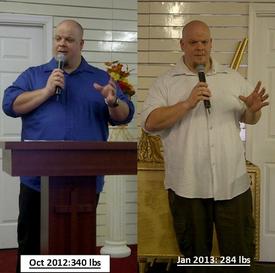The Most Accurate Method of Calculating TDEE?

Ploogy
Posts: 115 Member
It seems that TDEE is the key to a lot of this. However, I am still a little leery of any calculations that use such broad-defined variables like "sedentary, light, moderate, and active", but it appears all the available "calculators" use these broad brush strokes.
Has anyone sought out a more accurate means of calculating TDEE? Any thoughts on whether to use the Katch-McArdle over the Harris-Benedict Research Model? Given that Katch-McArdle takes BF% into account, I'm leaning towards using this. I've also heard it is more appropriate for folks with high BMI, as they deviate from the average person contemplated by the Harris-Benedict model.
Thanks for any input!
Has anyone sought out a more accurate means of calculating TDEE? Any thoughts on whether to use the Katch-McArdle over the Harris-Benedict Research Model? Given that Katch-McArdle takes BF% into account, I'm leaning towards using this. I've also heard it is more appropriate for folks with high BMI, as they deviate from the average person contemplated by the Harris-Benedict model.
Thanks for any input!
0
Replies
-
If you want to get more accurate than one of the equations and activity factors, you pretty much have to "measure" it yourself using your calorie count, change in weight, and about a month's time or more.
like this:
http://scoobysworkshop.com/calorie-calculator-calibration/0 -
Even BMI is a generalized calculation. Better to measure body fat with a device of some sort - or several and normalize the results - before using it in another calculation with generalizations. In the end though, it's just a target. So "close", to begin with, is good enough and you can always adjust it as you get more accurate feedback/data.0
-
I use IIFYM.com
It lets you specify how long you spend sitting, sleeping, moving around etc. I've set it as my basic day (ie sitting at my desk for 7.5 hours, 7.5 hours sleep, some light movement) then on days I work out I add the calories and eat most of them back.
It gives a clear explanation of your calories needed. I've worked my deficeit at TDEE minus 15% and I'm losing about 1.75lbs per week. This is an average, I've calculated it over the last 6 weeks.0 -
They're all estimates...most of them are pretty good estimates, but you have to play with your numbers a bit.0
-
bump0
-
I used this one:
http://www.exrx.net/Calculators/CalRequire.html
because it allows you customize more than any other i've come across. I calculated for a typical day without exercise. Then I add cals back in according to my HRM readout when I exercise each day. It's still all estimates but I feel like this works better for me since my activity level can fluctuate each week0 -
If you want to be scientific about it, you need to go to a clinic that can run the proper tests. This will include RMR hood test, submersion test for BF%...evidently there is even a solution to drink that allows them to track actual calories eaten, rather than the +/-20% estimates on our food packaging.0
-
Fantastic bits of advice, thanks everyone! I didn't even realize that such tests existed. I need to find out if my insurance covers them.
The idea about calculating at sedentary and adding back in exercise calories is a great one, since my days vary somewhat (I get to work from home on some days).
I am awaiting my BodyMedia Link and Bodyfat-measuring calipers and I think I'll be able to calculate a fairly accurate BMR and TDEE, and then I'll have a bit more confidence in the numbers!0 -
The Bodymediafit is supposed to be 95% accurate.0
-
I agree that one equation does not fit all body types! I just had my Resting Metabolic Rate Test done on Saturday. What a HUGE eye opener!! I have hypothyroidism and even being on medication, watching calories, and exercising has not helped. And yes i change my workouts every 4-6 weeksand do heavy lifting.
 I found out I'm not eating enough calories and they explained that my body will not let go of the fat until it knows I will keep feeding it properly. It costs $65 and took about 10 minutes. You can google RMR Testing and find places near you like a hospital, gym, clinic, etc. Worth every penny! 0
I found out I'm not eating enough calories and they explained that my body will not let go of the fat until it knows I will keep feeding it properly. It costs $65 and took about 10 minutes. You can google RMR Testing and find places near you like a hospital, gym, clinic, etc. Worth every penny! 0 -
nm.0
-
If you want to get more accurate than one of the equations and activity factors, you pretty much have to "measure" it yourself using your calorie count, change in weight, and about a month's time or more.
like this:
http://scoobysworkshop.com/calorie-calculator-calibration/
Bump...0 -
If you want to get more accurate than one of the equations and activity factors, you pretty much have to "measure" it yourself using your calorie count, change in weight, and about a month's time or more.
like this:
http://scoobysworkshop.com/calorie-calculator-calibration/
^^^fantastic^^^0 -
Great info everyone! I have been struggling with this same question, so I input my stats into each of the sites that were recommended and came up with an average TDEE for myself. I guess that would be a good starting place for daily caloric requirements. Thanks!!0
-
Fantastic bits of advice, thanks everyone! I didn't even realize that such tests existed. I need to find out if my insurance covers them.
The idea about calculating at sedentary and adding back in exercise calories is a great one, since my days vary somewhat (I get to work from home on some days).
I am awaiting my BodyMedia Link and Bodyfat-measuring calipers and I think I'll be able to calculate a fairly accurate BMR and TDEE, and then I'll have a bit more confidence in the numbers!
Your bodymedia fit should give you a much better idea of your TDEE than the calculators. Add up your calories burned for the week then divide by 7. That should give you a more accurate one0 -
Fantastic bits of advice, thanks everyone! I didn't even realize that such tests existed. I need to find out if my insurance covers them.
The idea about calculating at sedentary and adding back in exercise calories is a great one, since my days vary somewhat (I get to work from home on some days).
I am awaiting my BodyMedia Link and Bodyfat-measuring calipers and I think I'll be able to calculate a fairly accurate BMR and TDEE, and then I'll have a bit more confidence in the numbers!
I have (had, I just jumped into the shower this morning with the armband on....hoping a rice soak will bring it back to life) the BodyMedia armband. I found mine was within about 5% of my calculated TDEE.0 -
bump0
-
Bump0
-
*bump*0
-
I use my Body Media Link armband to calculate my TDEE. The online calculators aren't even close to what I get by measuring.0
-
I use my Body Media Link armband to calculate my TDEE. The online calculators aren't even close to what I get by measuring.
Does it measure your TDEE higher or lower than the calculators gave you?
Just wdonering since for me, both were really close. The armband was slightly lower.0 -
My measurements from the Armband are much lower than the TDEE calculators. By a couple hundred calories. The other thing is, I am a college professor. My activity levels are very much not constant from week to week in most cases. The TDEE calculator would not give me a good weekly update like the armband does.
Last Week:
Calculated: 3336
Measured: 31740 -
I agree that one equation does not fit all body types! I just had my Resting Metabolic Rate Test done on Saturday. What a HUGE eye opener!! I have hypothyroidism and even being on medication, watching calories, and exercising has not helped. And yes i change my workouts every 4-6 weeksand do heavy lifting.
 I found out I'm not eating enough calories and they explained that my body will not let go of the fat until it knows I will keep feeding it properly. It costs $65 and took about 10 minutes. You can google RMR Testing and find places near you like a hospital, gym, clinic, etc. Worth every penny!
I found out I'm not eating enough calories and they explained that my body will not let go of the fat until it knows I will keep feeding it properly. It costs $65 and took about 10 minutes. You can google RMR Testing and find places near you like a hospital, gym, clinic, etc. Worth every penny!
Thank you! I am having so many problems with my hypothyroidism, and I'm so glad to know I'm not the only one that struggles relentlessly! I'm going to ask my new dr about that and see if she can clue me in to where I can get that done!0 -
Bump0
-
I found this frustrating too. I went to 5 different sights and used the same activity level for each one. I then took my average BMR and TDEE from the five sites. I figured that was the best I could do. I have been losing about 1.2 pounds per week.0
-
I had my RMR tested at a clinic. My insurance DID cover it, too! Unfortunately, I found the reason for not losing weight was because my RMR was 1022 - all the calculators online including this site had me at about 1490.
Google RMR testing with your city and state and see what pops up. My dietician didn't even know where to get it done in my area.0 -
bump0
-
This .... I was 1050 when i had it tested

How did you approach it after you got that information?
ETA: Turns out i have hypothyroidism ...0 -
After finding out it was 1022, I figured that I couldn't eat less, so I started exercising more. I'm training for a sprint triathlon in the summer, as well as adding more strength training to get some metabolism back.
Unfortunately, I am having a bout with Sciatica right now, so my exercising has fallen off the tracks, but I'll be back soon!!!0 -
bump0
This discussion has been closed.
Categories
- All Categories
- 1.4M Health, Wellness and Goals
- 398.2K Introduce Yourself
- 44.7K Getting Started
- 261K Health and Weight Loss
- 176.4K Food and Nutrition
- 47.7K Recipes
- 233K Fitness and Exercise
- 463 Sleep, Mindfulness and Overall Wellness
- 6.5K Goal: Maintaining Weight
- 8.7K Goal: Gaining Weight and Body Building
- 153.5K Motivation and Support
- 8.4K Challenges
- 1.4K Debate Club
- 96.5K Chit-Chat
- 2.6K Fun and Games
- 4.8K MyFitnessPal Information
- 13 News and Announcements
- 21 MyFitnessPal Academy
- 1.6K Feature Suggestions and Ideas
- 3.2K MyFitnessPal Tech Support Questions
























